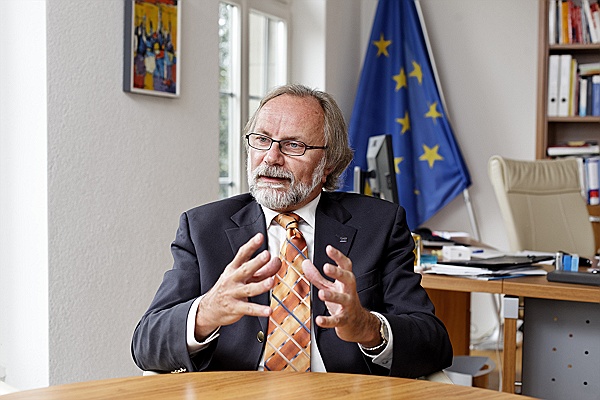Brussels meeting yields little progress

Switzerland has promised to make concrete proposals to the European Union in the coming weeks on how to adapt bilateral accords to changing EU and Swiss legislation.
The EU has been blocking discussions on new agreements until the institutional question is resolved, while Bern would like to make progress on issues such as electricity or technical barriers to trade.
Speaking in Brussels after meeting Swiss President Eveline Widmer-Schlumpf and Foreign Minister Didier Burkhalter on Tuesday, European Commission president José Manuel Barroso said Swiss proposals to focus on one sector, the electricity market, as a model for future agreements was not good enough.
For Barroso, there has not been enough progress on talks about the European market as a whole, despite the fact that Switzerland benefits from that market.
“We cannot have different rules; it would not be right,” he said. “Switzerland decided not to be part of the European Economic Area, but still wants to be a participant.”
Barroso is believed to have repeated to Widmer-Schlumpf and Burkhalter that a single model for all future agreements was necessary and must include provisions for taking on any developments in European legislation.
This has been the major sticking point in talks between Switzerland and the EU since 2010.
While Brussels would like Bern to commit itself to taking on board future changes from the so-called community acquis, the body of EU law, the Swiss do not want automatic adjustments to any accords signed.
“I respect Swiss specificities,” said Barroso at a press conference after the meeting. “But our interior market must be homogenous, and our companies as well as our citizens need a clear legal situation.”
Discrepancies
Regular changes in European and Swiss legislation mean traditional accords suffer from a number of discrepancies that must be ironed by joint Switzerland-EU committees. However given the large number of agreements – around 120 since 1972 – those committees are finding it hard to keep up.
Widmer-Schlumpf admitted that little progress had been made on issues involving access to the European market, but added that both parties still want to develop their relationship.
Bern also wants a global institutional framework for its relations with the EU, but believes there are different solutions. Widmer-Schlumpf said that Switzerland would make some proposals “in the coming weeks”, adding that some issues still have to be discussed at a domestic level, including with the cantons.
Burkhalter said that Swiss solutions for the institutional questions would be prepared and submitted during the spring.
The foreign minister would like to believe the situation is not blocked. “We didn’t want to discuss institutional questions only, but link them to concrete issues,” he said.
“So the idea of a sectorial approach was not bad. We are trying to build up some trust with the EU. We can make changes, but can we find a solution that suits Switzerland and the EU? That’s an open question,” he added.
No promises
For Burkhalter, the aim of his trip to Brussels was to present the cabinet’s position on the development of relations between Switzerland and the EU.
“We didn’t come to Brussels to make any promises,” he pointed out, warning though that if no common solutions were found, changes to the relationship might be doubtful.
Burkhalter also presented his so-called “roadmap” for future talks about Swiss-EU relations to Martin Schulz, president of the European parliament. Schulz told correspondents that it was interesting, and that finding pragmatic solutions was important.
“A solution that does not harm the EU’s integration and protects Switzerland’s interests must be found,” he added.
The Swiss government decided in 1992 to apply for negotiations on EU membership. The application is currently shelved.
The government’s 2006 report on European integration stated that the Swiss policy is based on bilateral treaties.
In August 2010 the government published a report on the country’s European integration policy, which declared that bilateral accords were still the best way to work with the EU, despite increasing difficulties.
It has concluded 20 major bilateral agreements with the bloc. There are also about 100 secondary bilateral accords between Bern and Brussels.
Bilateral treaty package I (1999)
Focused on opening up markets, the free movement of persons, technical barriers to trade, public markets, agriculture, air, road and rail transport and Swiss participation in EU research programmes.
Bilateral treaty package II (2004)
Covered new economic interests and extended to cooperation and political questions (internal security, asylum, environment and culture), the Schengen/Dublin Accords, savings tax, processed agricultural products, media, environment, statistics, fraud, pensions, education and professional training.
Negotiations are underway to update existing accords (the free movement of persons, technical barriers to trade, public markets, air transport, processed agricultural products,) There are plans to adapt the accords on savings tax and fraud.
New talks were launched in 2007 for electricity, agriculture, health, consumer protection issues, food chain and product safety, chemical product safety and company taxation.
The list should extend to other areas such as satellite navigation, cooperation on competition law, supervision of financial markets and access to the market of financial intermediaries.
(With input from Alain Franco in Brussels)

In compliance with the JTI standards
More: SWI swissinfo.ch certified by the Journalism Trust Initiative











You can find an overview of ongoing debates with our journalists here . Please join us!
If you want to start a conversation about a topic raised in this article or want to report factual errors, email us at english@swissinfo.ch.